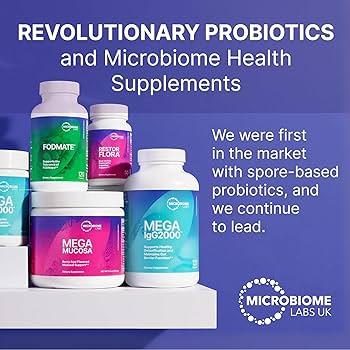In recent years, the spotlight on probiotics has largely focused on their bacterial components-but a new frontier is emerging in the realm of yeast-based probiotics. Scientists are delving deeper into the unique properties of these microscopic fungi, uncovering promising health benefits that extend beyond traditional probiotic offerings. From bolstering gut health to enhancing immune response, yeast-based probiotics are poised to reshape the nutritional landscape. This article explores the latest scientific breakthroughs and examines how these findings are translating into clinical applications, spotlighting a burgeoning field that could redefine personalized nutrition and therapeutic strategies.
Exploring the Science Behind Yeast-Based Probiotics and Their Mechanisms of Action
Yeast-based probiotics represent a remarkable subset within the broader probiotic category, distinguished by their unique cellular structure and resilience in the harsh gastrointestinal environment. Unlike bacterial probiotics, these eukaryotic microorganisms leverage multifaceted mechanisms to promote gut health and immune regulation. Core to their efficacy is their ability to adhere to the intestinal mucosa, outcompeting pathogenic microbes and preventing their colonization. Furthermore, yeast probiotics secrete bioactive compounds such as beta-glucans and mannans, which modulate the host’s immune response by stimulating macrophages and enhancing the production of protective cytokines. This intricate interplay supports a balanced gut microbiota and aids in maintaining intestinal barrier integrity.
Recent in vitro and in vivo studies have highlighted several key mechanisms that underpin the therapeutic potential of yeast-based probiotics:
- Pathogen inhibition: Direct antagonism against harmful bacteria through competitive exclusion and secretion of antimicrobial peptides.
- Immune modulation: Activation of innate and adaptive immune cells via cell wall components.
- Anti-inflammatory effects: Downregulation of pro-inflammatory mediators fostering gut homeostasis.
- Enhanced nutrient absorption: Improvement of enzymatic digestion and nutrient bioavailability.
| Mechanism | Biological Function | Clinical Relevance |
|---|---|---|
| Competitive Exclusion | Blocks pathogen adherence | Reduces GI infections |
| Immune Activation | Stimulates cytokine production | Supports immune defense |
| Anti-inflammatory | Modulates inflammatory pathways | Alleviates gut inflammation |
Clinical Evidence Supporting Yeast Probiotics in Digestive Health Management
Recent clinical trials have increasingly validated the role of yeast probiotics, particularly Saccharomyces boulardii, in enhancing digestive health across diverse patient populations. These studies highlight their efficacy in managing conditions like antibiotic-associated diarrhea, irritable bowel syndrome (IBS), and inflammatory bowel diseases (IBD). For instance, a meta-analysis published in the Journal of Clinical Gastroenterology demonstrated a significant reduction in diarrhea duration and severity when patients received yeast-based probiotics alongside conventional treatments. Such findings underscore the unique advantages of yeast probiotics, including their innate resistance to antibiotics and ability to modulate gut microbiota without antibiotic disruption.
- Antibiotic-Associated Diarrhea: Yeast probiotics reduce incidence and severity.
- IBS Management: Improvement in abdominal pain and bowel habit normalization.
- Prevention of Clostridium difficile Recurrence: Effective adjunct therapy.
| Condition | Clinical Outcome | Study Highlight |
|---|---|---|
| Antibiotic-Associated Diarrhea | Reduced diarrhea duration by 40% | Randomized controlled trial, 2023 |
| Irritable Bowel Syndrome | Improved symptom scores by 30% | Double-blind study, 2022 |
| Clostridium difficile Recurrence | Lowered recurrence rate by 50% | Multicenter trial, 2024 |
Beyond symptom management, emerging research is unveiling how yeast probiotics exert immunomodulatory effects that contribute to gut barrier integrity and inflammation reduction. This positions them not just as supplemental agents but as potentially essential components in integrative digestive therapies. Their ability to thrive in the gastrointestinal environment and antagonize pathogenic microbes provides a mechanism that complements bacterial probiotics, expanding the therapeutic arsenal available to clinicians. As clinical evidence mounts, medical guidelines are beginning to incorporate yeast probiotics as a recommended adjunct in digestive health protocols, signaling a promising shift towards evidence-based incorporation of non-bacterial probiotics in routine care.
Expert Recommendations for Integrating Yeast Probiotics into Daily Nutrition Plans
Leading nutritionists advocate for the strategic inclusion of yeast-based probiotics as a cornerstone in enhancing gut health and immune function. These probiotics, primarily Saccharomyces boulardii, offer resilience against harsh stomach acids, allowing them to colonize and modulate the intestinal microbiome effectively. Experts emphasize starting with low doses, such as 250 mg daily, gradually increasing to meet individual tolerance levels. Integration works best when coupled with a diet rich in prebiotic fibers – think onions, garlic, and asparagus – which nourish beneficial microbes and amplify the probiotic impact.
Practical advice highlights versatility: yeast probiotics can be seamlessly incorporated into smoothies, yogurts, and even formulated supplements tailored for specific needs like antibiotic recovery or digestive disorders. A balanced approach ensures optimal absorption and minimal side effects. Below is a quick-reference guide for optimal daily intake aligned with health objectives:
| Health Goal | Recommended Daily Dose | Ideal Food Pairings |
|---|---|---|
| Gut Microbiome Balance | 250-500 mg | Oatmeal, Bananas, Garlic |
| Post-Antibiotic Recovery | 500-1000 mg | Yogurt, Fermented Vegetables |
| Immune Support | 300-600 mg | Asparagus, Onions, Whole Grains |
- Consultation with healthcare professionals before starting supplementation is crucial.
- Rotate yeast strains occasionally to prevent tolerance buildup.
- Consistency in daily intake maximizes clinical benefits.
- Monitor digestive responses and adjust dosages accordingly.
To Wrap It Up
As research continues to unravel the complexities of yeast-based probiotics, their promising role in enhancing human health moves closer to clinical reality. From laboratory breakthroughs to real-world applications, these resilient microorganisms are poised to expand the nutritional landscape and offer new therapeutic avenues. Stay tuned as the science of yeast probiotics evolves, unlocking potential that could redefine both preventive care and treatment strategies in the near future.










